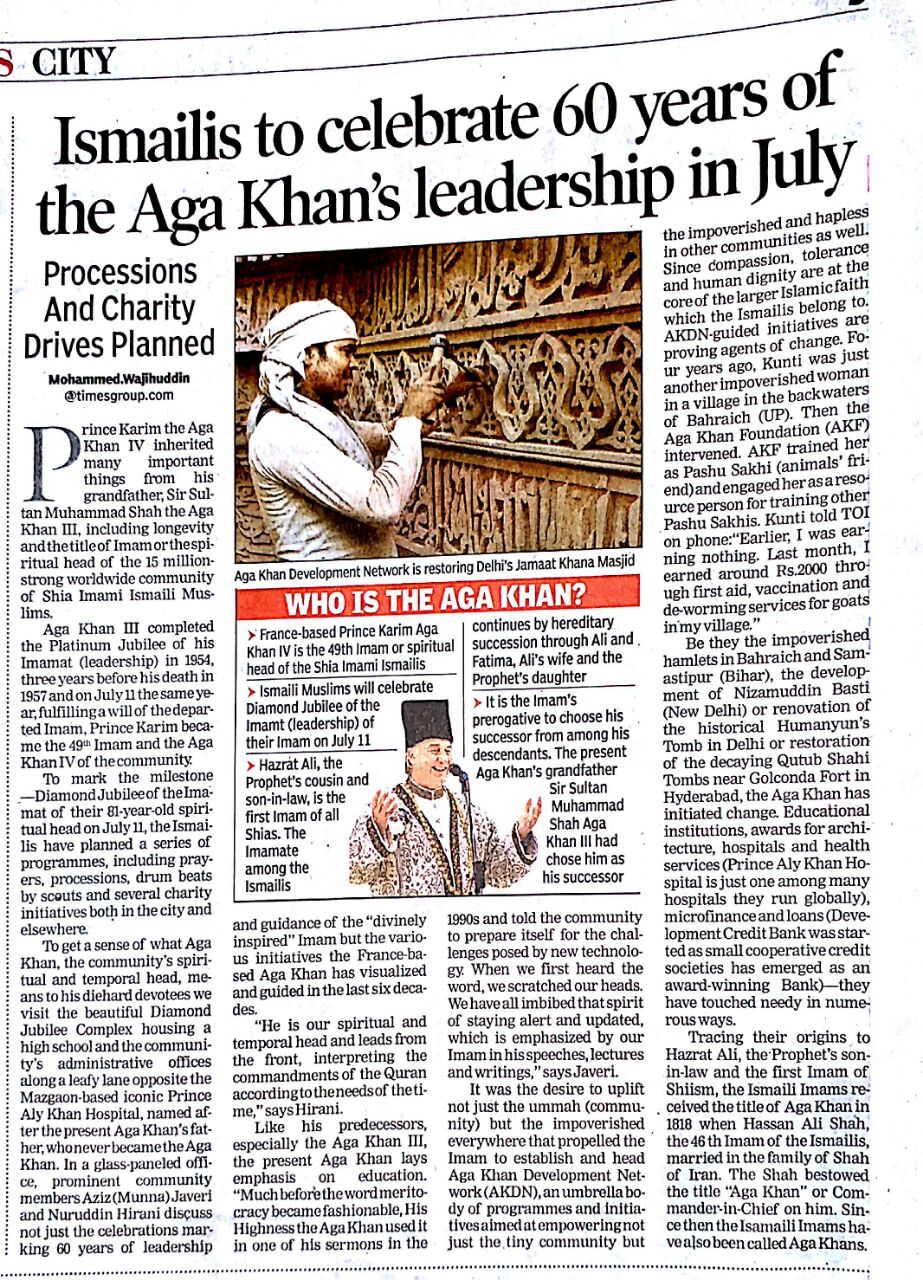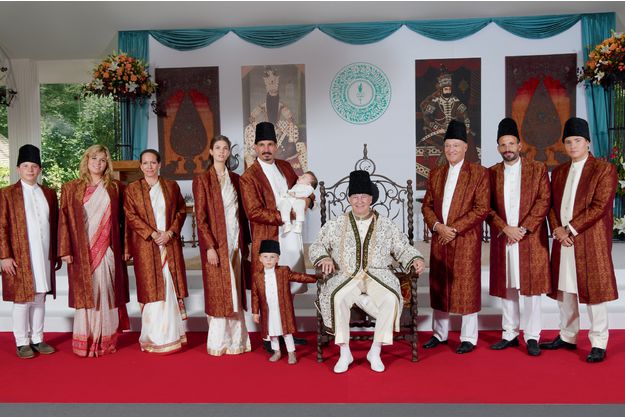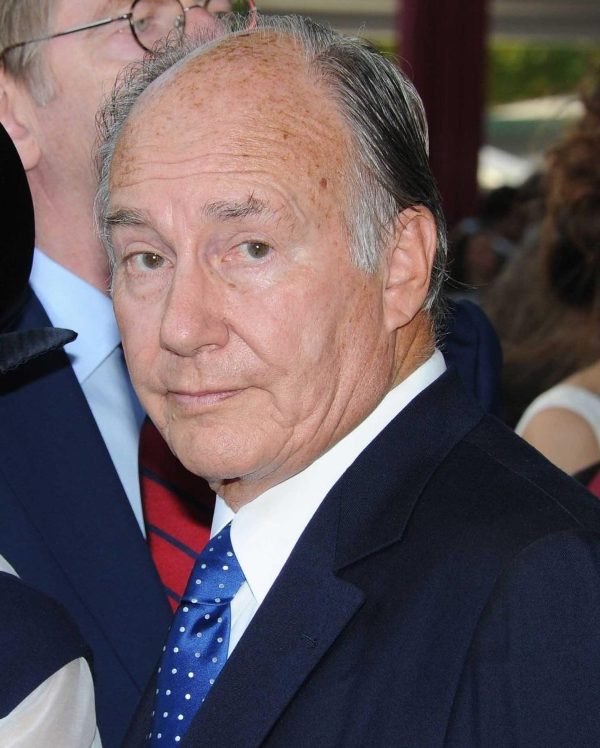Statement by the Prime Minister on Imamat Day
Ottawa, Ontario ‑
July 11, 2017
The Prime Minister, Justin Trudeau, today issued the following statement on Imamat Day:
“Shia Ismaili Muslims gather today in Canada and around the world to celebrate the diamond jubilee of their 49th hereditary Imam and spiritual leader, His Highness Prince Karim Aga Khan IV.
“Since becoming Imam in 1957, the Aga Khan has used his role to advance global humanitarian causes, helping to support sustainable development and poverty reduction projects and enhance civil society and education around the world.
“His spirit of cooperation also led the Aga Khan to establish, in 2006, the Global Centre for Pluralism, in partnership with the Government of Canada, and to choose Ottawa as its headquarters. In recognition of his commitment to diversity and pluralism and his many humanitarian efforts on behalf of people around the world, the Government of Canada made His Highness an honorary Canadian citizen in 2009.
“On this day, I invite all Canadians to reflect on the Aga Khan’s example as he continues to inspire us to show compassion towards all those less fortunate than ourselves. To all Ismaili Canadians celebrating the Diamond Jubilee, I wish all of you Khushali Mubarak!”
http://pm.gc.ca/eng/news/2017/07/11/sta ... imamat-day
*******
Aga Khan’s Diamond Jubilee: A celebration of solid partnership
The government, the commercial sector and civil society all have a responsibility to create an environment of interacting forces coming together for development.
Political stability; safety and security; citizen rights; predictable democratic practices; and an efficient, impartial legal and administrative framework are imperative.
Civil society has to be active to complement the other sectors.
More...
http://www.nation.co.ke/oped/Opinion/Ag ... index.html
********
Aga Khan 60th Anniversary Jubilee Puts Spotlight on Long-View for Development
Today is an occasion for celebration for the more than 15 million Ismaili Muslims around the world.
It is the 60th anniversary of Prince Karim al-Hussaini assuming leadership of the Shia Ismaili Muslims and the title of Aga Khan IV. He is a direct descendant of the Prophet Muhammad and well-known as a wealthy horse breeder who helped save the historic French horse racing grounds Hippodrome de Chantilly.
Media often compare the Aga Khan to the Pope because of his role of spiritual leader for Ismailis. The multi-billion dollar development network he founded and still directs is rarely mentioned.
The global development projects under his purview are so vast that the comparison would be more accurate only if the Pope ran the World Bank, led agencies of the United Nations — and was the CEO of Berkshire Hathaway at the same time.
The Aga Khan Development Network (AKDN), as it is called, spent more than $925 million last year on social programs, making it as big as well known NGOs like World Vision, Save the Children and Oxfam. And then there are the investments in hotels, electricity companies, financial services, media and tourism promotion that bring in $4.1 billion in annual revenue.
The profits from the investments and the millions of dollars donated by Ismaili Muslims each year all go back into paying for AKDN’s work.
More....
http://dawnsdigest.com/akdn/
*********
Aga Khan marks 60 years as leader of Ismaili Shias
11.07.2017‒
The Aga Khan, spiritual leader of the Ismaili branch of Shia Islam, is opening a year-long jubilee to mark his 60th anniversary leading the community with a call on Tuesday for greater respect for pluralism in the Islamic world and action to reduce poverty.
Among Muslim leaders, the Aga Khan holds a unique position. The community he leads as "imam" is not large – around 20 million adherents, compared to the estimates of several hundred million followers of Shia Islam's main branch, known as the "Twelvers." Sunnis make up the majority of the approximately 1.5 billion Muslims around the world.
But while other Islamic communities have a fragmented leadership, the 80-year-old, Paris-based Aga Khan is accepted across the Nazari Ismaili community as the "imam", or spiritual head, giving him a singular status.
His voice is amplified by his wide-scale development programmes, funded from his immense wealth and contributions from Ismailis, who are mainly centred in South and Central Asia but have significant communities in Africa and a small presence in Syria and Lebanon. The Aga Khan Development Network operates in 30 countries, leading health, education and infrastructure programmes.
Throughout the Diamond Jubilee year that began on Tuesday, the Aga Khan will travel to countries where the network operates to launch new programmes to alleviate poverty and increase access to financing for housing, education and childhood development, the network said.
Born Prince Karim al-Husseini in Geneva, he succeeded his grandfather as Aga Khan on 11 June 1957, at the age of 20. He is the 49th Ismaili imam, a line that traces itself back to Islam's prophet, Muhammad.
It is part of the mandate of the imam to "try to contribute to improving the quality of life of the community and those among whom the community lives," the Aga Khan told reporters ahead of the jubilee. He said Muslims should work on building an "empathetic, welcoming, peaceful and generous" society, which he called "a fundamental ethic of our faith."
"All those are ethical principles of our faith, they're very clear," he said. "So it's really a question of how we put those principles in place in governance and civil society."
"The focus should be on building quality of life and pluralism – meaning "equity toward all people and backgrounds," he added. Muslim countries "have been pluralist for many centuries," but various forces, including colonialism, have separated them by ethnic groups and sect, he said.
"We are in a period of history where I think that inherited situation needs to be dealt with," he said. (AP)
Related articles on Qantara.de:
https://en.qantara.de/content/aga-khan- ... aili-shias
*******
Ismailis celebrate Diamond Jubilee of Aga Khan
Members of the Ismaili Muslim community in the UAE are celebrating the Diamond Jubilee of the Aga Khan, marking his 60th year as the 49th hereditary spiritual leader of the community.
The celebrations - which are being held worldwide - will bring together members of the Ismaili community, as well as partners of the Aga Khan Development network and government and religious leaders across 25 countries. The Diamond Jubilee celebrates the occasion on July 11 in which the Aga Khan succeeded his grandfather, Sultan Mahomed Shah Aga Khan, as the Imam of the Ismaili Muslims 60 years ago, at the age of 20.
In Dubai - which also hosts an Ismaili Centre on Oud Metha Road - the Ismaili community has also established the Aga Khan Early Learning Centre, a nursery which takes children between the ages of 12 and 48 months, as well as the Aga Khan Scouts and Guides, which has had a presence in Dubai for over 30 years.
"As a leader of the Aga Khan Scouts and Guides, the spirit of volunteering is central to everything we do. On the occasion of the Diamond Jubilee, we are reminded of that spirit and the lifetime of service which His Highness the Aga Khan has devoted to the community in the UAE and globally around the world," said Raheel Chagani, a Group Scout Leader at the Aga Khan Scouts and Guides. "He once said of volunteers that 'their spirit, generating new ideas, resisting discouragement, and demanding results, animates the heart of ever effective society'."
"I am very happy on this momentous occasion to be part of the celebrations which are a milestone for the Ismaili Muslim Community," he added.
Today, the Aga Khan leaders a community of 15 million Ismaili Muslims spread across South Asia, Central Asia, the Middle East, Europe, North America and the Far East.
He's also the Founder and Chairman of the Aga Khan Development Network (AKDN), one of the largest development organisations in the world, with 80,000 staff operating in more than 30 countries.
Annually, the AKDN spends $925 million on non-profit social and cultural development activities, and operates over 200 health care institutions, two universities, and 200 schools and school improvement programmes in various parts of the globe. Additionally, the AKDN operates over 90 project companies in post-conflict and transitional economies, ranging from a large-scale hydropower project in Uganda to a mobile phone company in Afghanistan, which collectively generate more than $4.1 billion revenues.
A number of social, cultural and economic projects - designed to alleviate poverty and increase access to finance for education, health, housing, early childhood development and infrastructure in developing countries - are expected to be launched on the occasion of the Diamond Jubilee.
http://www.khaleejtimes.com/nation/duba ... f-aga-khan
******
One Jamat Diamond Jubilee images from India.
https://ismailimail.wordpress.com/2017/ ... ebrations/
******
One Jamat Diamond Jubilee images from Pakistan.
https://ismailimail.wordpress.com/2017/ ... ebrations/
*****
Celebrating Diamond Jubilee: A look at the Aga Khan’s extraordinary partnership with Canada
Today, millions of Shia Ismaili Muslims around the world, including thousands in Canada, are marking a historic occasion as they celebrate the Diamond Jubilee (60th anniversary) of His Highness the Aga Khan.
On July 11, 1957, at the age of 20, Prince Karim Aga Khan succeeded his late grandfather as 49th hereditary Imam of the Shia Ismaili Muslims, becoming the spiritual leader of the community’s now 15 million followers across 25 countries around the world.
While the majority of Ismailis live in Asia and Africa, there is a sizeable community in Canada, estimated at over 100,000. This diaspora dates back to the early 1970s when dictator Idi Amin came into power as Ugandan President and ordered the expulsion of Asian residents, including Hindus and Muslims.
Thousands of residents were told to pack up and leave Uganda, given 90 days to exit the country. It was then that the Aga Khan called then Canadian Prime Minister and longtime friend, Pierre Trudeau, asking for help. Canada opened its doors to thousands of Ismailis, the first time the nation had accepted such a large group of non-European refugees.
More..
http://dailyhive.com/vancouver/his-high ... artnership



